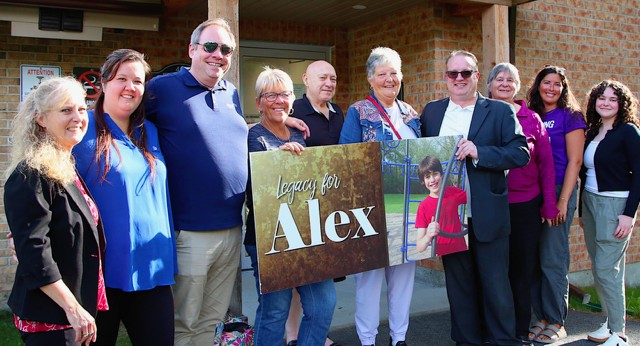Mental Health. Let’s talk about it.
Academic pressure, unstable housing, financial insecurity, job uncertainty, and social stressors. All these vulnerabilities can lead to a decline in mental health.
On September 22, 2023, Statistics Canada released a study titled “Mental disorders and access to mental health care,” based on the latest Mental Health and Access to Care Survey. The study found that Canadians aged 15 and older with a generalized anxiety disorder, doubled between 2012 and 2022. Major depressive episodes also rose from 4.7% in 2012 to 7.6% in 2022, while bipolar disorders also increased from 1.5% to 2.1% over the same period.
Some of these upward trends may be related to increased stress during the COVID-19 pandemic, but researchers noted that youth mental health was already declining before 2020.
This means that fewer youth report feeling good about their mental well-being, resilience, or life satisfaction, while more are being diagnosed (or self-reporting) conditions such as anxiety, depression, and other related disorders.
Mental disorders affect how people think, feel, or behave, and are associated with distress and impaired functioning. These conditions include mood disorders, anxiety disorders, post-traumatic stress disorder, schizophrenia, eating disorders, and substance use disorders. About 1 in 3 Canadians will experience a mental illness at some point in their lives, as reported on the Government of Canada’s website.
Mental health exists on a continuum.
For those who may not know, mental health refers to an individual’s overall psychological and emotional well-being, encompassing their ability to manage stress, cope with challenges and enjoy life.
While mental illness refers to specific, diagnosable conditions that cause significant distress or impairment. An individual can have a mental illness but good mental health, or poor mental health without a diagnosed illness.
The study also revealed that only about half of those who met diagnostic criteria for a mood, anxiety, or substance use disorder had spoken to a health professional about their mental health. Among those who did seek help, 1 in 3 said their needs were unmet or only partially met.
Most people reported talking to a family doctor or general practitioner, while fewer accessed specialists such as psychiatrists, psychologists, or psychotherapists. The most common form of care was counselling, followed by medication.
Why Is This Critical?
On September 20, 2019, in Gravenhurst, Ontario, Alex Kerswell fell victim to Canada’s growing mental health crisis. Just one week after his 17th birthday, he took his own life.
His mother, Leanna Kerswell, bravely shares his story:
“Trying to navigate the mental health care system that was disjointed was overwhelming and frustrating,” she said. “When we were able to get help for Alex, he didn’t always connect with the counsellors, but our options were limited (back then).

“Alex also did not always want help when we were able to get it for him because the stigma was too great. He did not want others to know what he was going through. Although he needed counselling—and we, as his parents, were at a loss as to what we could do to help him—he did not want anyone to find out.
“We did not realize how serious the situation was for a long time. Alex battled with his mental health and overuse of marijuana for a long time. At first, we didn’t know he was isolating himself because of mental health issues. We thought it was normal teenage behaviour. But when it got worse, it was harder to get the help he needed right away.”
Alex was identified as gifted in public school but was also diagnosed with ADHD, which made it difficult for him to make friends. He fell in with peers who introduced him to marijuana, and his use of the substance affected his mood stability and his overall mental health.
School was another struggle. Alex dropped out in Grade 11, and only later did his parents realize how negative his experiences with peers had been.
“Had we not pressured him to go to school, and had there been supports like Mind-Aid and Alex’s Place at that time, the outcome could have been very different,” Leanna said.
Despite these struggles, his family remembers him as a young man with extraordinary potential.
“We think of him every day, and we are broken because of losing him,” Leanna said. “His choice to take his life has shaken us to our core, and our guilt remains overwhelming. I’m told that these are typical feelings shared by other families who have lost a loved one to suicide, but that does not ease the pain. We decided that we needed to help other youth and their families who are battling with these issues.”
In the wake of their loss, the Kerswell family created the Legacy for Alex Kerswell charity to raise funds, awareness, and resources for youth in Gravenhurst who are struggling with mental health. Their mission also includes reducing the stigma surrounding mental illness.
On Saturday, June 21, 2025, Legacy for Alex Kerswell hosted its Annual Fundraising Dinner & Silent Auction, raising $16,000 for local youth initiatives. On September 10, 2025, the proceeds were presented to the following recipients:
$7,500 to the Elizabeth Fry Society of Simcoe Muskoka for use at Alex’s Place
$7,500 to Mind-Aid Muskoka
$1,000 to the Legacy for Alex Kerswell Gravenhurst High School Bursary Fund
These local initiatives have been breaking ground in Muskoka and continue to provide vital resources for those on their mental health recovery journey.

Alex’s Place, which opened in 2022 at 49B Pine Street, Bracebridge, ON, is a 12-unit transitional housing program for youth aged 16–24 who are experiencing homelessness. Named in memory of Alex Kerswell, the program provides young people with a safe and supportive environment to rebuild their lives and move forward.
Alex’s Place is owned by the District Municipality of Muskoka and operated by the Elizabeth Fry Society of Simcoe Muskoka. This incredible facility offers wraparound supports including life-skills development, crisis management, transition to permanent housing, and access to mental health services. It has become a vital stepping stone toward stability and independent living for marginalized youth in the region.

“The ongoing funding from Legacy for Alex Kerswell goes far beyond financial contribution; it’s an investment in the future of young people in Muskoka,” said a representative at Alex’s Place, “This generous donation will provide supplies to deliver vital programming to teach essential life skills and give occupants an opportunity to grow. It will also contribute to food security and access to basic necessities, which are often unattainable for youth when they first enter Alex’s Place.”
Leanna Kerswell also spoke about the ongoing challenge of youth homelessness in Muskoka:
“There is a waiting list for spaces in Alex’s Place. We need more facilities like this to support youth, with wraparound supports like those provided by the Elizabeth Fry Society of Simcoe Muskoka at Alex’s Place,” she said. “Youth are vulnerable and they need these organizations to help them cope with life, to help them get their feet back on solid ground, and to find ways of moving forward in a positive way.”

Another local initiative receiving a generous donation is Mind-Aid Muskoka. Thanks to Legacy for Alex Kerswell, more youth in Muskoka will now have the opportunity to receive individualized mental health navigation support, connect to resources that reduce barriers to care, and build stronger pathways to wellness. Mind-Aid’s team of mental health advocates help young people under 30 and their guardians find the right supports tailored to their needs.
In a statement, Mind-Aid emphasized the importance of this contribution:

“This donation is not only an investment in Mind-Aid, but in the young people of Muskoka. We are deeply grateful for Legacy for Alex Kerswell’s commitment to supporting youth mental health and ensuring that no young person in our community ever feels alone in their wellness journey.”
As highlighted in Statistics Canada’s survey, and echoed by the Kerswell family, seeking and finding the right help can mean the difference between simply surviving and truly moving forward in one’s mental health journey.
“Catching it early and having discussions with your child is very important,” Leanna said, speaking about how parents and guardians can take steps to support their children’s mental health. “They need to know that you are on their side, no matter what. They need you to be the anchor in their storm. They need to be able to count on you so that they feel comfortable opening up and sharing their feelings.”
She added:
“We did not understand just how bad the school situation was for Alex, and our pushing him to stay in school was one of the reasons why he ended up taking his life. Take what your child tells you seriously. Seek assistance from Mind-Aid to help you navigate the mental health care system. Make sure you have the school, your family doctor, and counsellors all on the same page with regards to how to approach helping your child. And make sure you allow your child to take mental health days. They are as important—if not more so—than physical sick days.”
In January 2020, the Kerswell family launched the Legacy for Alex Bursary Fund which is awarded to students at Gravenhurst High School (GHS), the same school Alex attended, who have demonstrated resilience in overcoming adversity.
GHS said, “We extend our sincere thanks to the Kerswell family, whose ongoing support of this bursary, in memory of their son Alex, continues to support our students in their pathway beyond secondary school.”
Leanna Kerswell also created a Facebook page, Legacy for Alex, to share resources and offer support. As of September 11, 2025, the group has grown to 933 members, a testament to the community’s commitment to breaking down stigma around mental health.
When asked what her “best-case future” for mental health support in Muskoka and across Canada would look like, Leanna shared a clear vision:
“I would like to see these topics incorporated into school curriculums starting in public school, and for there to be a full mandatory course in high school. This would help normalize discussions and reduce the stigma around these issues.
I would also like to see more psychologists available in schools so students have someone to turn to who can guide them.
I would like to see more discussions at home regarding youth mental health, with free courses made available to parents, guardians, and families.
I would like to see waitlists eliminated for mental health and homelessness services.
And I would like to see more funding for mental health and homelessness resources—a funding model similar to what we have for physical health.
Mental health is health.”








